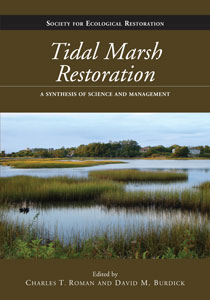"Tidal Marsh Restoration fills a need in providing practical and scientific insight to restoration planning."
Ecological Restoration
"The volume is an outstanding summary of what we have learned about salt marsh restoration in New England and the Maritimes..."
Native Plants Journal
"a useful synthesis of regional restoration issues that will add to the growing list of handbooks and reviews of tidal marsh restoration from around the country."
Wetlands
"Tidal Marsh Restoration is good piece of work and a compliment to any professional library."
Natural Areas Journal
"Editors/coastal ecologists Roman and Burdick, along with numerous contributors, provide chapters covering the basics of tidal marsh restoration, techniques used in restoration, and many case studies of projects."
Choice
"Tidal Marsh Restoration: A Synthesis of Science and Management explores the advances in the attempts to restore damaged salt marshes that have been reduced in number through human excesses. ... Many writers come together to give a scholarly review on these elements on how they have succeeded and failed throughout the world. With a great amount of information, charts, and graphs spread throughout, Tidal Marsh Restoration is a scholarly take on this international project, highly recommended."
Midwest Book Review
"If you are interested in coastal wetlands and their restoration, especially in New England, this book is an essential addition to your library. It is comprehensive, nicely organized, and the chapters are based on up-to-date compilations of the literature as well as a wealth of knowledge based on teh practical experiences of well-chosen authors."
Dennis F. Whigham, Senior Botanist, Smithsonian Environmental Research Center
"In their foreword to Tidal Marsh Restoration, Hood and Simenstad observe that restoration scientists and managers are physicians for dysfunctional ecosystems. To make the analogy more specific, Roman and Burdick's book is a bible for 'ecosystem cardiologists': If the circulatory system of the salt marsh is not functioning, then nothing else matters. This is a must-read book for those interested in wetlands 'vascularization' and its consequences."
Jack Gallagher, Professor Emeritus, Halophyte Solutions Laboratory, University of Delaware

